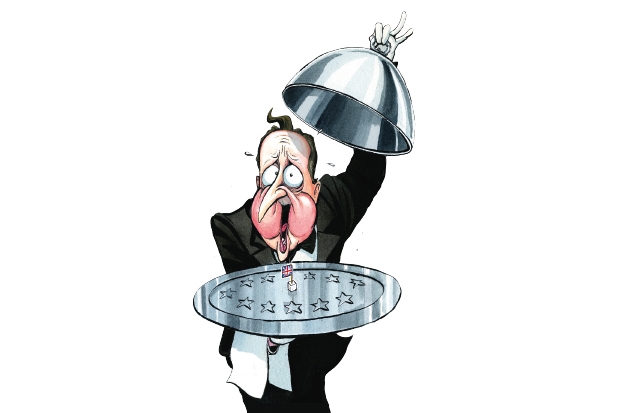In Thursday’s Times, Tim Montgomerie announced that after 28 years, he was leaving the Conservative party. Such a momentous decision requires an equally momentous explanation. Tim has failed to provide one. The gravamen of his charge was that David Cameron is no Margaret Thatcher. Without in any way casting doubt on Lady Thatcher’s achievements, or on her right to be regarded as our greatest peacetime Prime Minister, the reality is more complex than Tim’s hagiographic version would have us believe.
‘It wasn’t just the colour of her politics, but the strength.’ True, she was strong, on many occasions. But what about the Rhodesia/Zimbabwe settlement, the handover of Hong Kong, the Anglo-Irish Agreement, the Single European Act, the deal to renew the Common Agricultural Policy: what about her entire record on public spending? On all of those, we could argue about the detail for the rest of this Century, yet one point is clear. They were not exercises of unalloyed strength. They were compromises: examples of politics and government as the art of the possible. Tim claims that she was successful in securing a rebate in the UK’s contribution to the EEC. Yes, but not as big a rebate as she originally demanded. That outcome, too, was a compromise.
Tim also asserts that to her, winning elections was only one-tenth of politics. It is certainly the case that she sought power for a purpose, but she was always desperately keen to win elections. Before 1983, she was extremely nervous, even though she only had to beat dear old Michael Foot. In 1987, it was far worse: see Charles Moore’s account. All in all, Margaret Thatcher was a much more pragmatic politician than she ever acknowledged. Her lack of political self-knowledge does not excuse analysts of British politics from lack of historical understanding.
It is always important to remember that Lady Thatcher had a schizoid political personality: one of the reasons for her success. Dividing the atom can produce enormous power. Dividing her personality, ditto. She often expressed dissatisfaction with the policies of the government which she led. If she did ultimately, accept the limitations of the possible, it was only after she had extended them. But on Europe, to take an obvious example, she always did a deal in the end.
When Charles Powell made that point a few days ago, and thus concluded that she would have opposed Brexit, Tim Montgomerie was furious. He cast doubt on Charles’s claim to know Mrs Thatcher’s mind. That is total nonsense. For seven and a half years, he was her closest advisor; I cannot think of a more important counsellor in the whole of modern British history. Only her husband Denis was better placed to understand her thinking. Tim even tried to denigrate Lord Powell by sniggering about the way he pronounces his name: ‘Pole.’ His younger brother Jonathan calls himself ‘Powell.’ At a guess, more than 99 percent of the UK’s male population pronounce their surname in the same way as their father did. Charles Powell is one of them. If explanations are due, Jonathan Powell owes us one. So does Tim Montgomerie, for sinking into mean-minded chippiness.
He has two criticisms of the Cameron government which might appear more important in that they do not depend on sour sniggering over nomenclature. The first concerns Europe; he is convinced that David Cameron’s deal is inadequate. But if he wants us to take his criticisms seriously, Mr Montgomerie ought to be franker. He is a Brexiter. Nothing would satisfy him that is compatible with The UK remaining in the EU.
Although the second attack might appear more substantial, it too is defective. Tim criticises the Government for its record on public spending. He wants deeper and faster cuts. Very well: where would he cut? Anyone who calls for bigger cuts ought to feel intellectually, politically and morally obliged to tell us how and where.
Tim Montgomerie is unhappy about the growth of inequality and the government’s failure to promote social justice. Hmmm. When it comes to equality of opportunity, this government has an impressive record. Its education and welfare reforms are tackling problems which her late Ladyship sidestepped. In education, it will equip children to face challenges. In welfare, it will prevent them from choosing idleness. But Tim seems to be perilously close to advocating equality of outcome. If that is what he believes, he was right to resign from the Tory party.






Comments